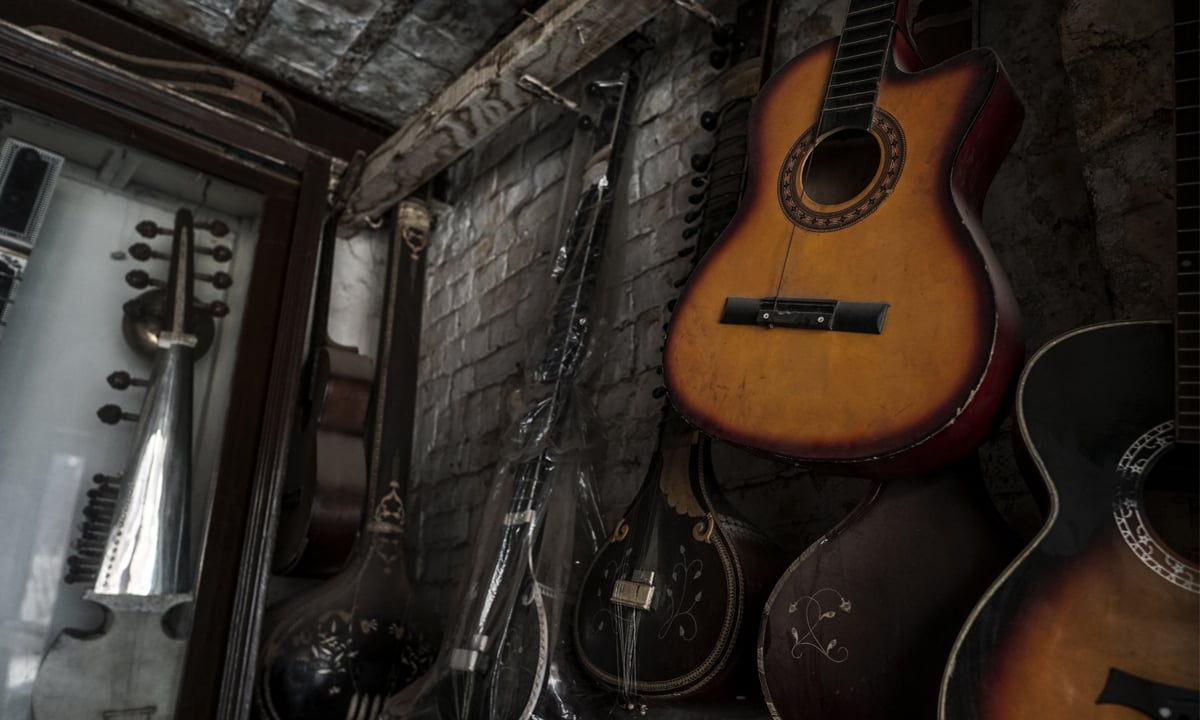
Muhammad Fyaz leads us up a narrow set of stairs to his workshop on the roof. He is 60 years old and climbs slowly but surely, careful not to slip on the glossy concrete. Unlatching the metal door, he welcomes us in with an apology. “I don’t have many parts right now,” he says, motioning to a hollowed out hemisphere resting on the table, surrounded by wood shavings. “In India, they use kaddu to make this, but here we just use wood.”
‘This’ is an unfinished sitar tumba drying in the winter sun that’s streaming through the windows. Fyaz is one of the last remaining sitar makers in Lahore, his hands carrying the muscle memory of an art that will soon be consigned to history. He is remarkably matter of fact about this. “If there’s no need for something then who will do it?”

It’s not much of a workshop — there’s a table and a drawer full of metal saws and various other tools. The space is cluttered with pieces of wood and bottles of spirits and polish. The sitars are made entirely by hand and each one takes about a month to complete. But Fyaz works slowly, mainly to keep himself occupied. “If there was demand for eight sitars a month then I could make eight sitars a month,” he says.

Sitar-making runs in the family. He was taught the craft by his father Muhammad Ramzan, who in turn was trained by his father, the legendary Sher Muhammad. The family’s legacy runs back to the Mughal era, the craft being handed down from father to son for generations.
Except now: Fyaz hasn’t taught his own sons how to make sitars. The generational rope stretching back centuries is fraying, with only a few threads left. He repeats the same phrase like a mantra: “If there’s no need for something then who will do it?”

In Lahore, other than Fyaz and his relatives, there is only 70-year-old Ziauddin and his son, who operate a separate sitar shop in Basaanwala Bazaar – a small market opposite the Mayo Hospital in Gawalmandi – and know the art of making these instruments. It wasn’t always like this — there used to be several sitar players in Pakistan.
Fyaz tells me about Ustad Ashraf Sharif Khan and Ustad Saleem Khan, renowned sitar players for whom he would provide instruments. “They have moved to Germany now,” he says. Other avenues of income have also dried up; art colleges don’t have as many sitar players and musical instrument shops have a low demand for sitars.

The picture is not as bleak throughout Pakistan. In Peshawar, for instance, interest in classical South Asian instruments has been steady. Abbas Jan, owner of a shop selling rebabs and other classical instruments in Peshawar, says business has been good over the last 35 years since they opened. They craft their rebabs and sitars in a private workshop and then export all over Pakistan.

But Prince Music Centre, also known affectionately as ‘Mamu’ and one of the oldest music shops in Karachi, has been witnessing a steady decline in the demand for classical instruments over the last 15 years.
People are still buying them, but on a much smaller scale than before. “The new generation prefers rock music,” says the owner. They take up guitars and drums rather than the tabla and sitar.

Back in Lahore, Fyaz tilts the hollowed kaddu into the sunlight, illuminating the wood inside that’s been scorched black after being licked by flames. Thin slices of wood are bent and then glued into this hemispherical shape before being dried with fire, creating the main body of the instrument.
Fyaz picks up a beautiful, finished sitar off the wall rack and begins playing softly, scattering notes here and there, the melody meandering. “You have to know how to play a little bit, if you want to make a sitar,” he says.

As Fyaz gets some photographs taken on the rooftop workshop, I move towards the open window to feel the sunlight. The house is tucked away down a spiral of alleyways near Lakshmi Chowk, the distant thrum of construction audible even from here.
Moments of silence are punctuated with the cries of street vendors and loud neighbours. The workshop feels like a sanctuary, a small remote island of tinkering. When I ask him if he feels sukoon working up here, any kind of mediative effects of his labour, he responds with a vague non-committal yes. “Aadat hai, bachpan se,” he says. Since the age of ten, he’s been practicing his craft.
This article was originally published in the February 2018 issue. To read more subscribe to the Herald in print.
The writer is a videographer from Lahore. He holds a degree in English literature from Warwick University and runs a Pakistani music and culture blog called 'Mosiki'.






